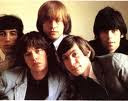








One of the biggest musical acts in history, The Beatles were John Lennon(guitar), George Harrison(guitar), Paul McCartney (bass) and Ringo Starr (drums). Lennon and McCartney began playing together in The Quarrymen in 1957; Harrison joined later that year. Before they became The Beatles, they were also Johnny and the Moondogs and The Silver Beatles, joined at times by bandmates including bassist Stuart Sutcliffe (23 June 1940 - 10 April 1962) and drummer Pete Best (b. 24 November 1941); Best was replaced by Ringo to form the final foursome. The early Beatles performed shows in Hamburg, Germany and Liverpool, England, playing covers of early American rock and roll plus original songs by Lennon and McCartney. Their 1962 release of "Love Me Do" charted in the U. K., and in 1963 their song "She Loves You" was the biggest hit in U. K. history.
The Who were one of the great rock bands of the 1960s and 1970s. In its glory years the group consisted of guitarist and main songwriter Pete Townshend(b. 19 May 1945), singer Roger Daltrey (b. 1 March 1944), bassist John Entwistle (b. 9 October 1944, d. 27 June 2002) and drummer Keith Moon (b. 23 August 1946, d. 7 September 1978). Early on the group was part of the "Mod" movement, playing R&B music in stylized tailored suits, before morphing into an unruly proto-punk band famous for smashing its instruments at the end of live performances. This period is epitomized by the oft-mentioned lyric "Hope I die before I get old" in the band's 1965 tune "My Generation."
British musical group. Its original members were Mick Jagger (b. 1943), Keith Richards (b. 1943), Brian Jones (1944 – 69), Bill Wyman (b. 1936), and Charlie Watts (b. 1941). The band was formed in 1962 when Jagger, Richards, and Jones, who had been performing sporadically in a blues band, recruited Wyman and formed their own group. Watts joined the band in 1963. Jagger was the lead vocalist, while Jones and Richards played guitars, Wyman played bass, and Watts played drums. The band's name was adopted from a Muddy Waters song. By 1966 a series of outstanding songs had made the band second in popularity only to the Beatles. Jagger and Richards wrote most of its songs, which are marked by a driving backbeat, biting and satirical lyrics, and simple but expressive instrumental accompaniments. You can find the rest fo this infomation at http://www.answers.com/
The Who were one of the great rock bands of the 1960s and 1970s. In its glory years the group consisted of guitarist and main songwriter Pete Townshend(b. 19 May 1945), singer Roger Daltrey (b. 1 March 1944), bassist John Entwistle (b. 9 October 1944, d. 27 June 2002) and drummer Keith Moon (b. 23 August 1946, d. 7 September 1978). Early on the group was part of the "Mod" movement, playing R&B music in stylized tailored suits, before morphing into an unruly proto-punk band famous for smashing its instruments at the end of live performances. This period is epitomized by the oft-mentioned lyric "Hope I die before I get old" in the band's 1965 tune "My Generation."
British musical group. Its original members were Mick Jagger (b. 1943), Keith Richards (b. 1943), Brian Jones (1944 – 69), Bill Wyman (b. 1936), and Charlie Watts (b. 1941). The band was formed in 1962 when Jagger, Richards, and Jones, who had been performing sporadically in a blues band, recruited Wyman and formed their own group. Watts joined the band in 1963. Jagger was the lead vocalist, while Jones and Richards played guitars, Wyman played bass, and Watts played drums. The band's name was adopted from a Muddy Waters song. By 1966 a series of outstanding songs had made the band second in popularity only to the Beatles. Jagger and Richards wrote most of its songs, which are marked by a driving backbeat, biting and satirical lyrics, and simple but expressive instrumental accompaniments. You can find the rest fo this infomation at http://www.answers.com/